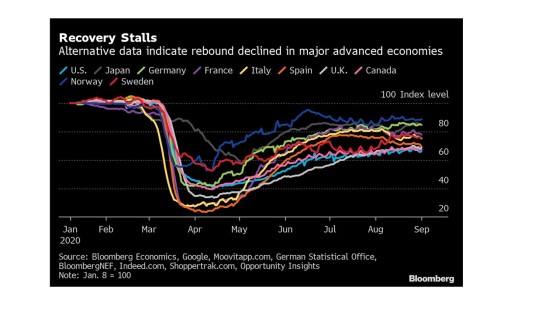You are currently browsing the tag archive for the ‘Japan’ tag.
Economic Recovery: We All Should Prepare for a Long Convalescence
By Shlomo Maital
How quickly will economies in the US, Canada, Japan and Europe bounce back? Will it be fast, like China, or very slow, like the US?
Bloomberg has been tracking this key issue, using a wide variety of indicators; the visual track for 10 countries is shown in the diagram.
It has been 5 months since these economies bottomed out, with 60% – 80% decline in the economy, owing to lockdown, in a very short period of a month or six weeks.
So far, no matter what the national strategy (or lack of one, as in the US) — herd immunity (Sweden), local lockdown (Italy), school-opening and back-to-normal prematurely (US) — economies are plateau-ing, at 60% to 80% of their previous pre-pandemic level. And in most of the 10, COVID-19 is making a comeback, in a second or third wave — with the age of those infected declining sharply, as young people emerge, head to bars, and parties, and colleges – and become ill.
And, if that isn’t bad enough, a new forecast from the leading pandemic prediction institution, at Univ. of Washington, reports this: A new long-term forecast predicts a significant acceleration in Covid-19 deaths in the U.S. as colder weather takes hold. Under the latest projections from the Institute for Health Metrics and Evaluation at the University of Washington’s School of Medicine, deaths could rise to 410,000 by the end of 2020. In a worst-case scenario, there could be 620,000 fatalities, more than three times the number of Americans who have died over the past eight months. The difference between the projected and worst-case scenarios comes down to how diligent authorities are in mandating masks and social distancing, according to the report.
Readers, fasten your seat belts. Many of us yearn for the good old days, like, those we have 6 months ago. It does not seem likely any time soon. Prepare yourself and your family for a rocky road to recovery. It will be a marathon, not a sprint. Even optimistists believe an effective vaccine won’t be available for many months – and then, how many vaccine-deniers will turn it down, lacking trust in leaders who follow politics rather than science?
Who’s In Charge? Hey – I am!!!
What We in the West Can Learn from the East
By Shlomo Maital
Why is Asia, in general, doing so much better than the US and South America, in battling the pandemic? I found a possible answer in an old American Psychologist article, published 36 years ago. *
In times of enormous uncertainty, as today, people grasp at straws. They try to re-establish control of their lives, when they feel it has slipped away.
According to Weisz et al., there are “two general paths to a feeling of control”: Primary control, and secondary control.
* Primary control: “individuals enhance their rewards by influencing existing realities (i.e. other people, circumstances, symptoms, or behavior problems).” In the US South and West (Florida, Texas, Mississippi, Arizona), people take control by saying, who are you, Governor, Mayor, to tell me to lock down, stay inside, wear a mask??!! Nuts to that. I’ll do what I wish. I am a free person. I have First Amendment rights. Who’s in charge here? I am!!!
This is primary control. And – it leads to disaster, as we are seeing now. Because it focuses on the wellbeing of me, the individual, and the hell with everyone else. And it denies reality, even when spoken by those who know.
* Secondary control: “Individuals enhance their rewards by accommodating to existing realities and maximizing satisfaction or goodness of fit with things as they are”.
Primary control is highly valued in the US, for example. Secondary control is far more highly valued in Japan – and other Asian nations. China, for instance, has a 5,000-year-old tradition of “the greater good”. This is the basis of ‘secondary control’. Accommodating to existing realities.
Primary control people seem to deny the pandemic; there have been COVID-19 parties in the US — where a person with novel coronavirus is invited to a party, as a sign of defiance, a belief it’s all a hoax. Recently, according to news reports, “a 30-year-old dies after attending ‘Covid party’ in Texas. Patient said: ‘I think I made a mistake, I thought this was a hoax, but it’s not’. He paid a heavy price.
I believe that in general, if you drew a color map of the world – color countries with “primary control” red, color countries with “secondary control” green – you will get a fairly close match with the coronavirus hotspot countries today, with a few exceptions.
It sounds very extreme but – I believe we are seeing a global drama of social evolution. A black-swan pandemic event occurs that kills people. Nations try to adapt. Some have cultures that kill many people, rather than save them. Other nations have cultures that save people’s lives rather than kill them. And out of this mess, emerge nations whose culture is better adapted to the environment, stronger and fitter.
It’s not too late. We in the West can learn from the nations in the East. After decades of arrogance and alleged superiority, it is now time to become very very humble. The East knows something. We can learn from them, before it’s too late.
* “Standing Out and Standing In: the Psychology of Control in America and Japan.” John R. Weisz et al. American Psychologist, September 1984. Pp 955-969.
Local Empathy: Toilet Innovation in Japan and Kenya
Incremental Excremental Innovation
By Shlomo Maital
Toto’s Sound Princess
The core of innovation is meeting an unmet want or need in a creative manner. The tough part is simply identifying that need. Here are two examples of how empathy – feeling AS IF you were the person in need – is crucial. And how incremental innovation can be…excremental.
* A Japanese toy company, Toto, invented the otohime, or “Sound Princess”. It is installed in thousands of restrooms across Japan. What does the Sound Princess do? When you press the button (see photo), it mimics the sound of flushing water.
Why? Many Japanese women were continually flushing, so that the sound would mask the sounds they made in using the facility. The portable purse-friendly device is a huge best-seller in Japan.
I would LOVE to know the back story, of how (and more important, WHO!) invented this device.
* The Umande Trust, a Kenyan community organization, tackled the problem of disposing of human waste in Africa. A common solution is the ‘flying toilet’ – plastic bags of human waste, flung as far as possible. Umande builds massive biodigesters that composts the output of a fleet of toilets. Each toilet charges a few pennies for each use, and makes about $400 per month. The biodigester composts the waste, creates biogas and makes hot water for some 400 residents.
There are probably millions of would-be entrepreneurs who are trying to devise apps, to rival WhatsApp, sold recently for $19 b. The field is too crowded. I wish they would focus on dark corners, basic areas where there are unmet needs because, well, human waste is just not appealing. By empathizing with ordinary people, observing their daily lives, entrepreneurs can create value in areas far from the standard smartphone. But, it starts with empathy, a keen eye and sharp ear, and a deep passion for making the lives of ordinary people better, even incrementally.
* Dayo Olopade, International New York Times, March 1-2, 2014, p. 6




